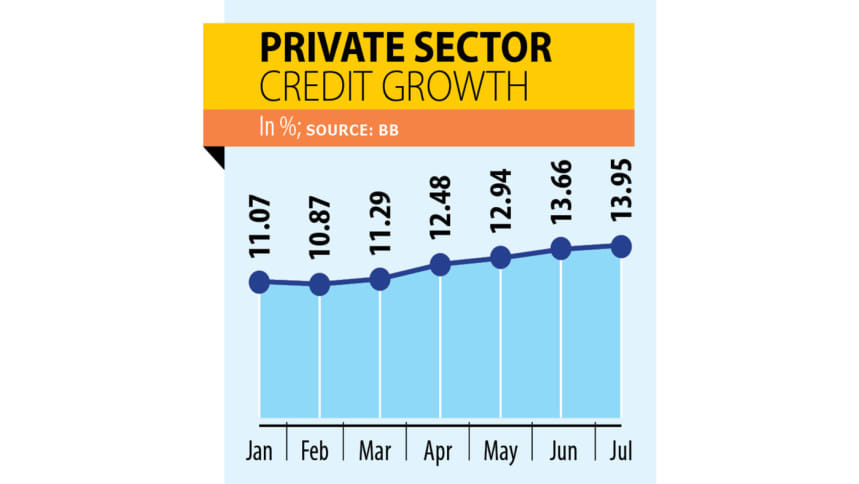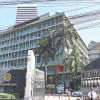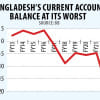Credit growth keeps rising

Private sector credit growth in Bangladesh rose further in July despite a contractionary monetary policy adopted by the Bangladesh Bank for the current fiscal year to tame higher inflation.
The credit growth inched up to 13.95 per cent in the first month of the fiscal year, up from 13.66 per cent in June, data from the central bank showed.
The credit growth has been rising for five months despite a number of measures from the central bank aimed at curbing import bills. Most of the loans are used to facilitate overseas purchases.
Higher import payments, fueled by the need to feed the economy recovering from the coronavirus pandemic and the escalated cost of commodities in the global markets, pushed up the credit growth in Bangladesh.
In addition, many businesses are reluctant to borrow from the global market after interest rates have gone up internationally following the hiking of central bank rates in most countries. So, they are relying more on the domestic sources for funds.
The BB has set a private credit growth target of 14.1 per cent for the fiscal year of 2022-23 compared to 14.5 per cent last financial year.
The lower growth target is aimed at containing inflation, which stood at 7.48 per cent in July, slightly lower than the nine-year high of 7.56 per cent in June.
Syed Mahbubur Rahman, managing director of Mutual Trust Bank, thinks the credit growth may rise further in the next couple of months as many lenders are currently settling import bills that earlier enjoyed deferral support from the central bank.
At the height of the coronavirus pandemic, the BB allowed businesses to settle import bills after a year, giving them a much-needed breathing space amid business slowdown as the crisis sapped demand at home and abroad.
Many businesses are unwilling to take loans from foreign sources due to the fluctuation of the exchange rate of the taka against the US dollar, Rahman said.
The taka has lost value by at least 20 per cent against the American greenback in the past one year.
"Global lenders have recently hiked the interest rate on loans after their central banks raised the key interest rate to tame inflation," Rahman said.
"So, entrepreneurs are submitting more applications to local banks for loans than in the past to run their operations smoothly."
For example, the Federal Reserve's key interest rate since been raised to a range of 2.25 per cent to 2.5 per cent in an effort to tackle inflation since March from. It was almost zero earlier.
More rate hikes are likely in the world's largest economy.
In July, the European Central Bank raised interest rates for the first time in more than 11 years as it tries to control soaring eurozone inflation. It plans further hikes this year.
Amid higher credit demand in Bangladesh, the liquidity pressure in the banking sector is on the increase.
Banks are already facing a tightening of liquidity after the central bank began mopping up the taka from the banking system by injecting dollars since the beginning of the last fiscal year.
This prompted many banks to raise the interest rate on the fixed deposits to 6.5-7 per cent, in contrast to 2.5-3 per cent a year ago, to mobilise funds.
Salehuddin Ahmed, a former governor of the central bank, sees the uptrend of credit growth as a good sign for the economy.
"Injection of more credit means economic activities are getting stronger. Ordinary people can get some respite from their ongoing economic hardship if required funds are available with them," he said.
"The rising credit growth will give a boost to the supply side, encouraging producers to augment production. It will also ease inflationary pains for commoners."
Anis A Khan, a former managing director of Mutual Trust Bank, however, says there is no other alternative but to unveil more austerity measures given the gravity of the ongoing economic turbulence globally.
He suggested the central bank squeeze the money supply so as to contain inflation.
Monzur Hossain, research director of the Bangladesh Institute of Development Studies, says the composition of credits is important.
If loans are used in making investments and production, it would not stoke much inflation, but if they are aimed at consumption, then it would accelerate inflation, he said.
He, however, added: "A 14 per cent growth in credit may not be consistent in the current economic situation."
Another economist said: "We want lower credit growth and money supply. The interest rate on loans should go up from the 9 per cent to curb imports."
The total outstanding loans in the private sector stood at Tk 13,52,566 crore in July.
The higher credit growth came in a month when import bills rose 63 per cent year-on-year to $7.66 billion. The settlement of letters of credit, however, decreased 10.3 per cent from June's $8.54 billion.

 For all latest news, follow The Daily Star's Google News channel.
For all latest news, follow The Daily Star's Google News channel. 









Comments